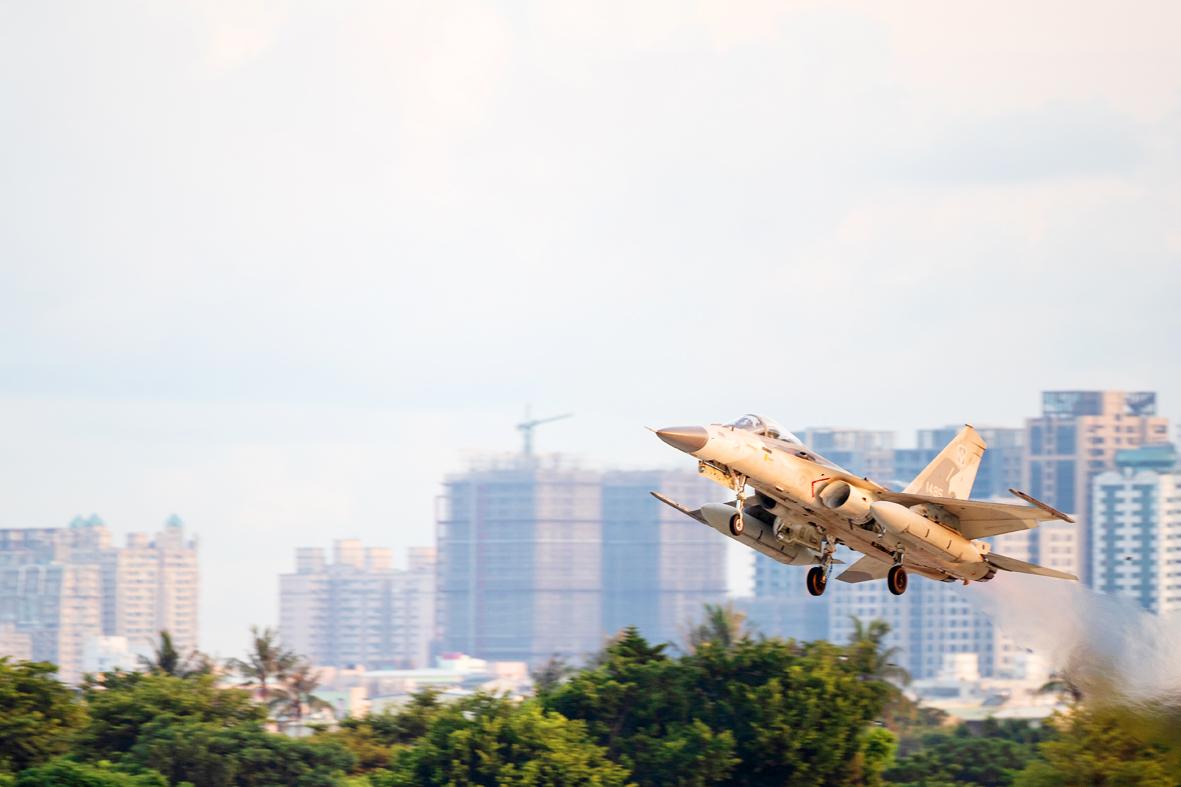Republic of China Air Force fighters yesterday took to the skies to intercept a simulated air attack by hostile forces on the second day of the annual live-fire Han Kuang war games.
The aircraft included Indigenous Defense Fighters and Mirage 2000 fighter jets, photographs provided by the Military News Agency showed.
The operations on the ground involved radar vehicles and the Avenger air-defense missile system — a US-made self-propelled surface-to-air weapons platform to defend against cruise missiles, uncrewed aerial vehicles and other low-flying aircraft — the Ministry of National Defense’s news service said.

Photo courtesy of the Ministry of National Defense
Sirens wailed across Taiwan at 1:30pm, signaling the start of a 30-minute Wan An public air-raid drill, and an alert was sent to mobile phones at the beginning and end of the annual drill.
“This is an exercise simulating a missile attack, but it will not involve traffic controls or dispersal of pedestrians,” the text message read, as the government this year decided not to clear the streets to avoid having people cluster in shelters, due to the COVID-19 pandemic.
The Han Kuang exercises are not open to the media, except tomorrow, when an anti-landing drill is to be held at Jianan Beach in Taichung.
Monday’s exercises involved the launch of Patriot surface-to-air missiles and Sky Bow air-defense missiles to intercept a simulated missile attack on the Presidential Office Building in Taipei.
At the Military Police School Linkou Campus, special forces from the military, police and coast guard units conducted a drill to rescue government leaders held hostage by invading forces inside critical government offices.
Fighters based on the west coast flew to the east coast to avoid a simulated missile attack, while armored vehicles took cover in culverts and under bridges.
The exercises are to continue this week.
The computer-simulated tabletop training component of the exercises is scheduled to be held from Sept. 14 to 18.

The manufacture of the remaining 28 M1A2T Abrams tanks Taiwan purchased from the US has recently been completed, and they are expected to be delivered within the next one to two months, a source said yesterday. The Ministry of National Defense is arranging cargo ships to transport the tanks to Taiwan as soon as possible, said the source, who is familiar with the matter. The estimated arrival time ranges from late this month to early next month, the source said. The 28 Abrams tanks make up the third and final batch of a total of 108 tanks, valued at about NT$40.5 billion

Travel agencies in Taiwan are working to secure alternative flights for travelers bound for New Zealand for the Lunar New Year holiday, as Air New Zealand workers are set to strike next week. The airline said that it has confirmed that the planned industrial action by its international wide-body cabin crew would go ahead on Thursday and Friday next week. While the Auckland-based carrier pledged to take reasonable measures to mitigate the impact of the workers’ strike, an Air New Zealand flight arriving at Taipei from Auckland on Thursday and another flight departing from Taipei for Auckland on Saturday would have to

A group from the Taiwanese Designers in Australia association yesterday represented Taiwan at the Midsumma Pride March in Melbourne. The march, held in the St. Kilda suburb, is the city’s largest LGBTQIA+ parade and the flagship event of the annual Midsumma Festival. It attracted more than 45,000 spectators who supported the 400 groups and 10,000 marchers that participated this year, the association said. Taiwanese Designers said they organized a team to march for Taiwan this year, joining politicians, government agencies, professionals and community organizations in showing support for LGBTQIA+ people and diverse communities. As the first country in Asia to legalize same-sex

MOTIVES QUESTIONED The PLA considers Xi’s policies toward Taiwan to be driven by personal considerations rather than military assessment, the Epoch Times reports Chinese President Xi Jinping’s (習近平) latest purge of the Chinese People’s Liberation Army (PLA) leadership might have been prompted by the military’s opposition to plans of invading Taiwan, the Epoch Times said. The Chinese military opposes waging war against Taiwan by a large consensus, putting it at odds with Xi’s vision, the Falun Gong-affiliated daily said in a report on Thursday, citing anonymous sources with insight into the PLA’s inner workings. The opposition is not the opinion of a few generals, but a widely shared view among the PLA cadre, the Epoch Times cited them as saying. “Chinese forces know full well that